Episode 14: The Trail

With days to go before the election, we put New England’s changing political DNA under the microscope with pollster and University of New Hampshire political scientist Andrew Smith. We also have an update on the roadside outhouse turned voting booth from Episode 11. Plus, renewable energy is best for the planet, but reality here is a little…gassier. And we take a detour from the campaign trail and head for the hills, and mountains.
One of These Things is Not Like the Others

Should New Hampshire’s outsize roll in presidential politics be reconsidered? (Credit: NHPR)
New England is seen as reliably Democratic. Along with New York, it’s part of a big blue blob in the upper right hand corner of those election maps we’ve seen all too much of.
But it wasn’t always like this. And, as we know, there’s one state, with a famous independent streak, that has always been a little different. A poll by WBUR in Boston – taken less than a week before election day – shows Republican Donald Trump pulling slightly ahead of Democrat Hillary Clinton in New Hampshire.
While the Granite State seems like an outlier, political scientist Andrew Smith says it’s really the last state in a regional shift from Republican to Democratic that’s been happening across decades. We invited him into the studio to learn about how and why New England’s political DNA is changing.
Smith teaches political science at the University of New Hampshire, and directs the UNH Survey Center. He’s co-author of the book The First Primary: New Hampshire’s Outsize Role in Presidential Politics.
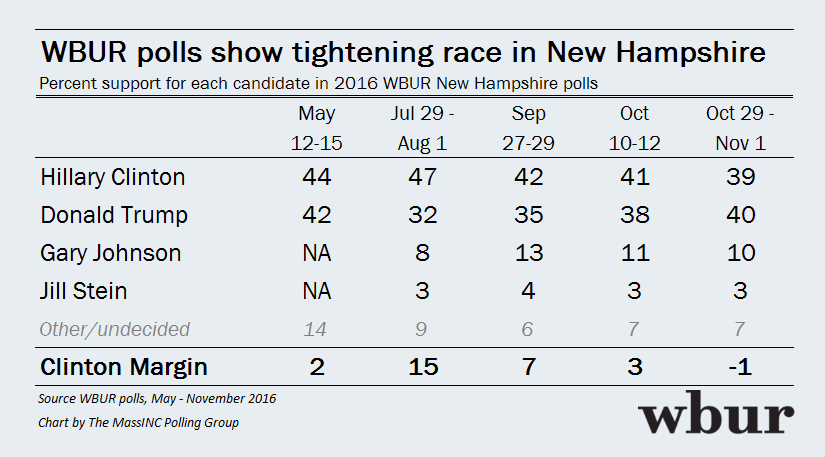
New Hampshire voters may take elections seriously, but a few weeks back we met one Granite Stater who definitely doesn’t take them too seriously. Chris Owens hung a sign reading “Official NH Voting Booth” on an outhouse at his farm stand, and invited visitors to “cast their ballots” for Trump or Clinton in one of two toilets inside. The results are in! New Hampshire Public Radio’s Sean Hurley reports.
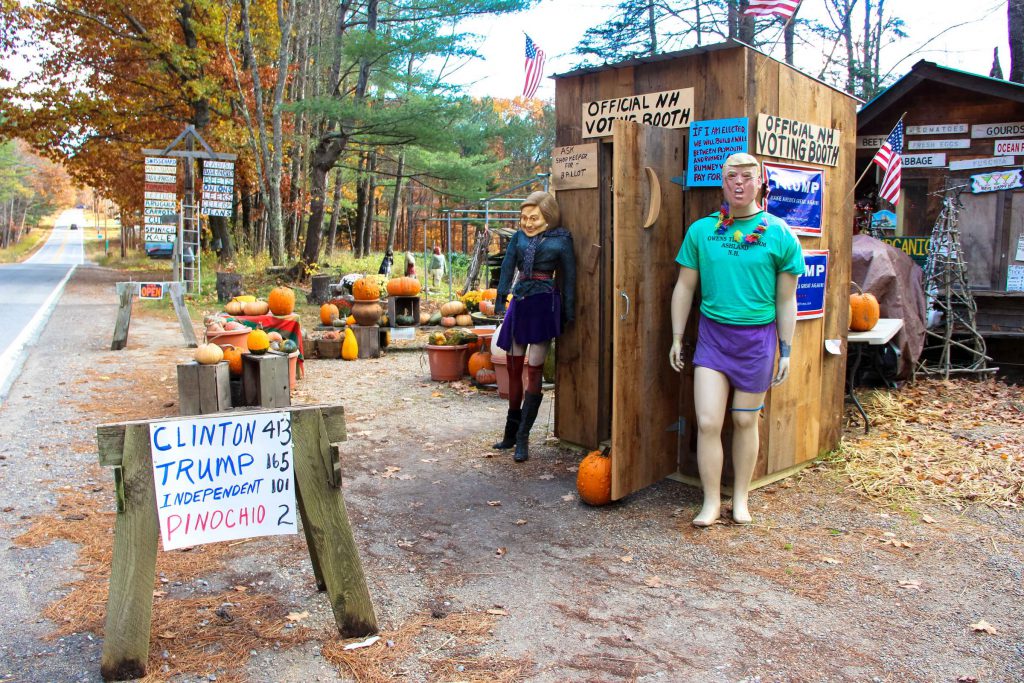
Farmstand owner Chris Owens posted the results of his poll a week before the election. (Credit: Sean Hurley/ NHPR)
Got the urge to nerd out over New Hampshire politics? Check out New Hampshire Public Radio’s database of election results going back to 1970.
Gas Pains
For months, clean energy advocates have been anxiously awaiting the results of a contest of sorts. It was a request for proposals by the three Southern New England states, Connecticut, Massachusetts and Rhode Island, to build new project that would help the region meet both its greenhouse gas emissions goals – and overall energy needs.
When the winners were unveiled, there were some big surprises. First, the mix of wind and solar projects, totaling 460 megawatts, are largely located in southern New England. That means large wind farms proposed in northern Maine, and a transmission project for Canadian Hydro-Power lost out.
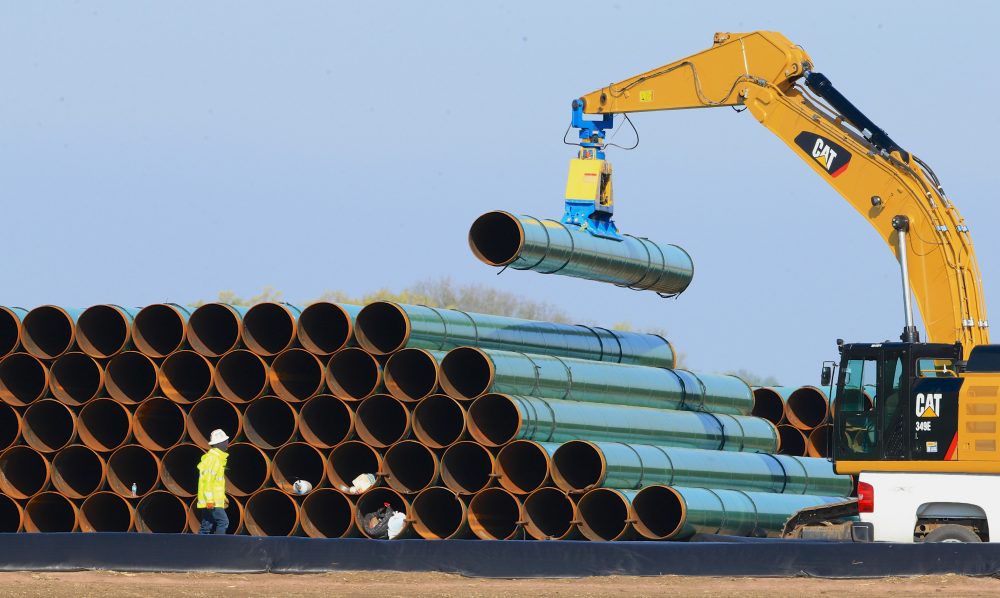
Pipes for a proposed natural gas pipeline in South Dakota are stacked at a staging area. (Credit: Nati Harnik/AP)
The other big surprise was that the state of Connecticut pulled the plug on another plan, to construct more natural gas pipelines in the state. It was prompted by previous decisions in Massachusetts and New Hampshire that said it was unconstitutional to pass along the cost of building pipelines to electric customers. That would have left Connecticut ratepayers on the hook – without help from their regional neighbors.

Protesters rally in downtown Pittsfield, Mass. before an injunction hearing on a natural gas pipeline in July, 2016. (Credit: Adam Frenier/ NEPR)
This might mean the end of big pipeline projects like “Access Northeast.” And, it raises questions about the need for more gas-fired power plants, including those that have met with local opposition in Connecticut and Rhode Island.
But Connecticut officials are saying, “not so fast.” Right now, New England gets more than 50 percent of it’s power from gas, and state regulatory commissioner Katie Dykes says the fuel is necessary for the region to provide reliable, year-round power – even as it invests more in renewable energy.
Dykes been part of this process in her previous role as Connecticut’s Deputy Commissioner for Energy. She told us that the decision to halt the pipelines was done to protect ratepayers in her state.
Take a Hike
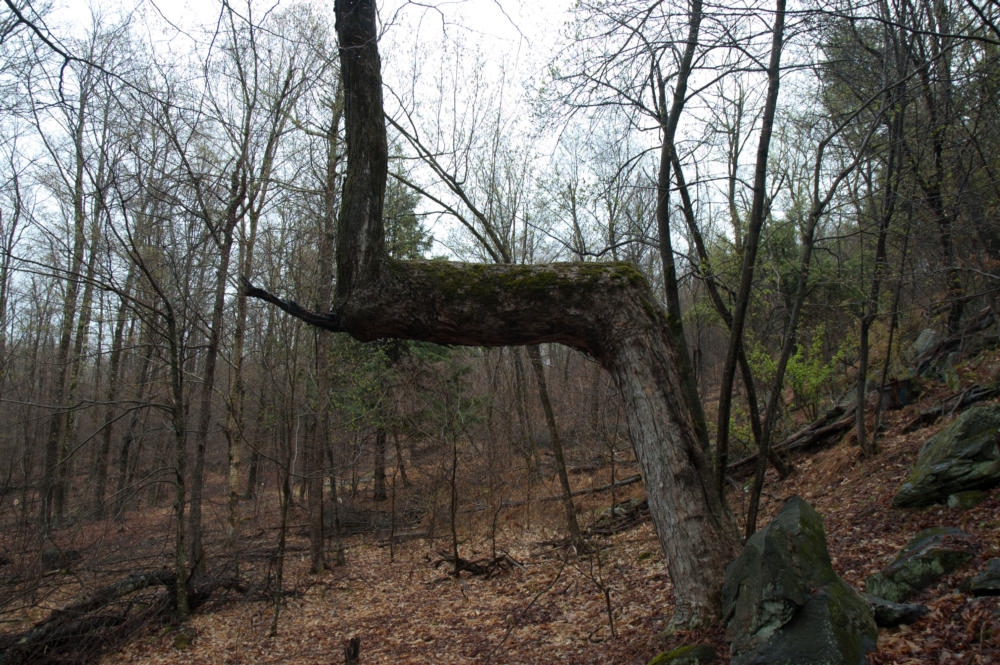
If you’re thinking, that tree couldn’t have grown that way naturally, your instincts are correct. (Credit: John Voci/NEPR)
If you spend any time walking in the woods, you see a lot of strange looking trees — trees shaped by the wind, or split by lightning. And — occasionally — some twists and turns are man-made. When walking in the woods near his Putney, Vermont, home, Dan Kubick discovered a most unusual tree. New England Public Radio’s John Voci has our story.
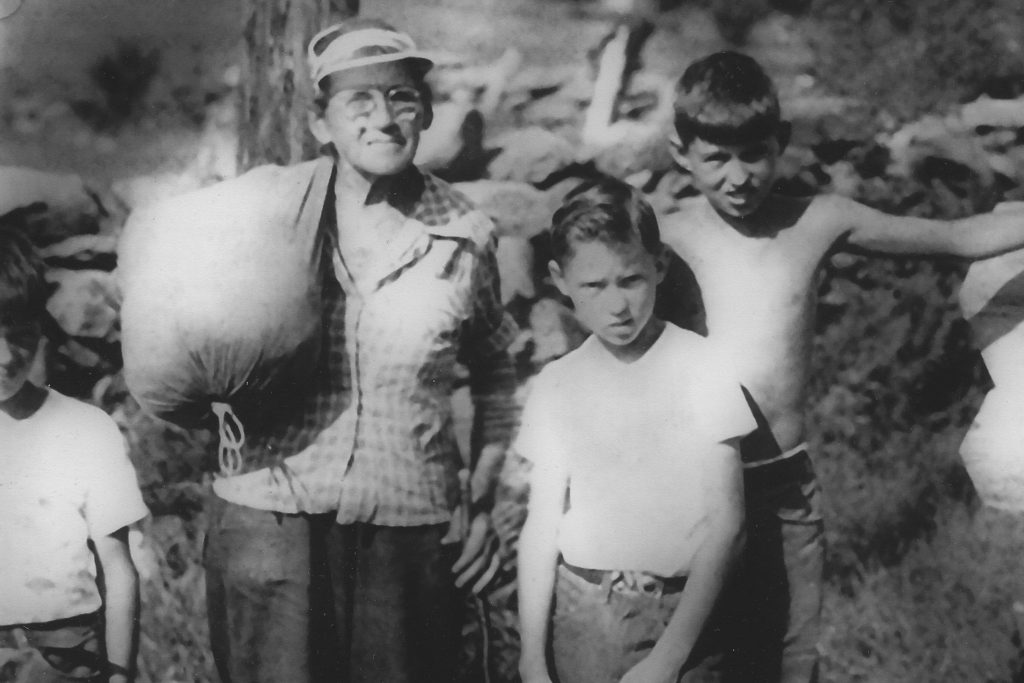
Emma Gatewood with Thomson brothers (from left) Tom, seven; David, nine; and Peter, 11; near the Thomson home in Orford, New Hampshire, on her through hike of the Appalachian Trail in 1955. (Courtesy of Peter Thomson)
 You might know someone who’s gone out looking for his or herself along the Appalachian Trail. Next year will mark the 80th birthday of the 2100- mile footpath. A third of the trail runs through New England, including its most rugged parts, ending at the summit of Mount Katahdin in Maine.
You might know someone who’s gone out looking for his or herself along the Appalachian Trail. Next year will mark the 80th birthday of the 2100- mile footpath. A third of the trail runs through New England, including its most rugged parts, ending at the summit of Mount Katahdin in Maine.
Emma “Grandma” Gatewood made headlines when she became the first woman to hike the entirety of the Appalachian Trail, back in 1955. She was 67 years old, and wore Keds. Writer Ben Montgomery, Emma’s great great nephew, tells her story.
Ben Montgomery’s book, Grandma Gatewood’s Walk came out in paperback earlier this year.
About NEXT
NEXT is produced at WNPR.
Host: John Dankosky
Producer: Andrea Muraskin
Executive Producer: Catie Talarski
Digital Content Manager/Editor: Heather Brandon
Contributors to this episode: Anthony Brooks, Sean Hurley, John Voci, Elliot Rambach
Music: Todd Merrell, “New England” by Goodnight Blue Moon, “Roast Beef of Old England” by the US Marine Band, “Sunrise Blues” by Samuel James
We appreciate your feedback! Send praise, critique, suggestions, questions, story leads, and tales from the trail to next@wnpr.org.
